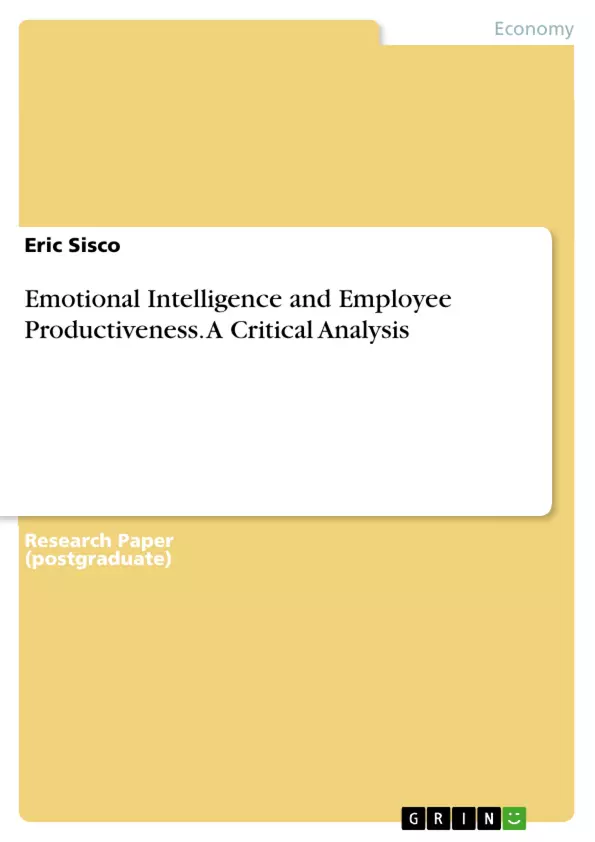The role of Emotional Intelligence (EQ) has started to be come more prevalent in the business world. The expanding global economy and increase of competitors in the marketplace has caused employers to look at different ways to evaluate and motivate their work staff. The firms want to ensure that they are getting not only the best person for the job, but the most productive person for the job as well. This is why the employers turn to EQ, the helps them understand the employees better and gives them a better indication on how they can motivate their employees.
This paper provides a critical analysis of research conducted to show that there is a direct correlation between employees that have high EQ and optimum performance. The research suggest that employees that have higher EQ have better job performance and productiveness than their colleagues that have lower EQ levels.
Inhaltsverzeichnis (Table of Contents)
- Abstract
- Introduction
- Emotional Intelligence
- Personal Life
- Professional life
- Career and Emotion Intelligence
- Performance
- Leaders
- Motivation
- Employee Selection
- Retention
- Training and Emotional Intelligence
- School and Emotional Intelligence
- Suggestions for Future Research
- Conclusion
Zielsetzung und Themenschwerpunkte (Objectives and Key Themes)
This paper investigates the relationship between Emotional Intelligence (EQ) and employee productivity, aiming to demonstrate a direct correlation between high EQ and optimal performance. The paper critically analyzes existing research to highlight the positive impact of EQ on various aspects of work, including motivation, leadership, and team dynamics.
- The role of EQ in increasing employee productivity and performance.
- The influence of EQ on employee motivation and engagement.
- The importance of EQ in effective leadership and team management.
- The link between EQ and successful employee selection and retention.
- The potential of EQ training programs in enhancing employee performance.
Zusammenfassung der Kapitel (Chapter Summaries)
- Abstract: Introduces the concept of EQ's growing significance in the business world, emphasizing its value in employee evaluation and motivation. The abstract highlights the paper's focus on demonstrating the link between high EQ and optimal employee performance.
- Introduction: Explains the increasing emphasis on incorporating EQ into hiring and training practices due to its positive correlation with employee productivity. The chapter sets the stage for exploring the benefits of high EQ in the workplace.
- Emotional Intelligence: Defines EQ as the ability to understand and manage one's emotions effectively, referencing key figures in the field and exploring different models of EQ. The chapter explains the significance of EQ in self-regulation, decision-making, and social interactions.
- Personal Life: Discusses the positive impact of high EQ on personal life, highlighting traits like trustworthiness, optimism, altruism, self-motivation, and creativity. This section emphasizes the universality of EQ's benefits.
- Professional Life: Explores the benefits of high EQ in the professional environment, emphasizing its role in leadership and motivation. The chapter cites research findings that demonstrate a strong correlation between high EQ and sales performance.
- Career and Emotion Intelligence: Highlights the significant contribution of EQ to job performance, citing research indicating that EQ accounts for a substantial percentage of success. The chapter explores the challenges of low EQ in stressful work environments.
- Performance: Delves into the influence of EQ on workplace performance, emphasizing its impact on individual and team productivity. The chapter cites research findings that demonstrate the positive impact of high EQ on revenue generation and effective team dynamics.
Schlüsselwörter (Keywords)
The primary focus of this paper is the relationship between Emotional Intelligence (EQ) and employee productivity. Key topics include the impact of EQ on employee performance, motivation, leadership, and team dynamics. The paper also explores the role of EQ in employee selection, retention, and training programs, highlighting the potential for improving workplace effectiveness through targeted development of emotional intelligence skills.
Frequently Asked Questions
How does Emotional Intelligence (EQ) affect employee productivity?
Research suggests a direct correlation between high EQ and optimal job performance, as employees with higher EQ are better at self-regulation, motivation, and handling workplace stress.
Why are employers increasingly using EQ for employee selection?
Firms want to ensure they hire not just the most skilled person, but the most productive and motivated individual who can thrive in team dynamics and competitive environments.
What is the role of EQ in leadership?
High EQ is crucial for effective leadership as it enables managers to understand and influence the emotions of their team, leading to better engagement and conflict resolution.
Can Emotional Intelligence be improved through training programs?
Yes, the paper explores the potential of EQ training programs to enhance workplace effectiveness and individual performance by developing emotional awareness and social skills.
How does high EQ benefit an individual's personal life?
Individuals with high EQ often display traits like optimism, altruism, and creativity, which contribute to better personal relationships and overall well-being.
- Quote paper
- Eric Sisco (Author), 2015, Emotional Intelligence and Employee Productiveness. A Critical Analysis, Munich, GRIN Verlag, https://www.grin.com/document/318734



